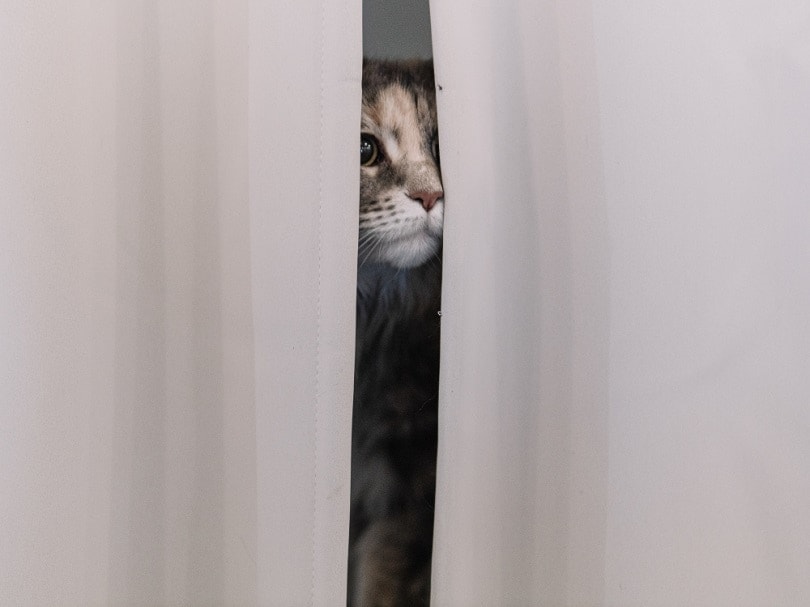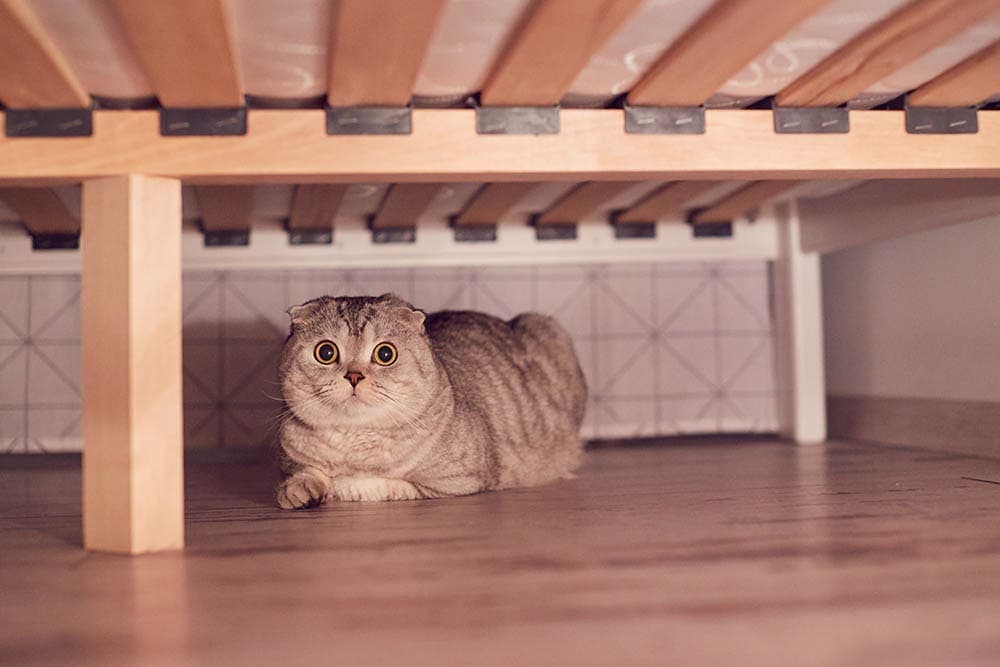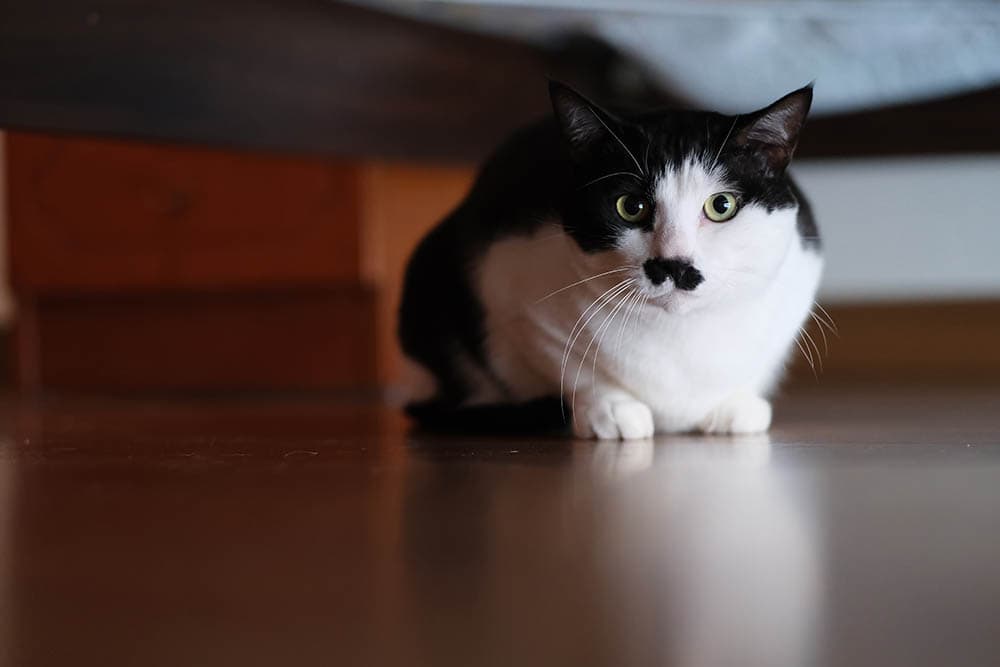Why Is My Cat Hiding Suddenly? 5 Possible Reasons & How to Help
Updated on
Some cats are naturally just a bit anti-social. It’s not unusual for these personality types to rarely be seen, especially when the household is hectic. However, if your cat is usually a social butterfly and you notice they’ve begun to stay out of sight frequently, the change could be a cause for concern. In this article, we’ll cover five possible reasons your cat is hiding suddenly and what you should do about them.

The 5 Reasons Your Cat Is Hiding Suddenly
1. Fear
One possible reason your cat is hiding suddenly is that it’s afraid of something and trying to protect itself. Maybe a new cat or dog is roaming the neighborhood, and your cat is frightened by their presence.
Construction outside or the presence of a new person inside could also inspire a fear reaction in your kitty. If your cat feels threatened but also knows it can’t possibly fight off whatever is scaring them, it likely feels its best option is to hide and hope the danger passes.
How You Can Help: Try to identify what might be scaring your cat. If it’s something outside like another animal, ask the owners to keep their dog or cat out of your yard.
If the threat is temporary, such as a construction project or visitor, help your cat feel at ease by creating a safe space for them to retreat, such as an interior room or closet. Provide a bed, food, and litter in the area so your cat can stay hidden until they no longer feel afraid.

2. Stress
Stress or anxiety is another possible reason your cat could be hiding suddenly. This type of hiding occurs when a significant change occurs in the cat’s life. For example, cats often hide after their family moves to a new house.
A new pet, significant other, or baby can also be sources of stress. Home renovations or repairs sometimes spark this response as well. Besides hiding, you may notice other signs of anxiety, such as inappropriate urination, vocalizing, or even aggression.
How You Can Help: Again, first try to identify the source of the stress. If it’s something temporary, like home renovations, provide a safe space, as discussed earlier. Many sources of stress aren’t temporary, however.
If you have a new pet or family member, slowly introduce them to your cat, offering treats and reassurances. Increase the one-on-one attention you give your cat, so they don’t feel left out.
Ensure there are no resource-guarding issues by providing enough litter boxes and toys for everyone. If nothing seems to be helping, ask your vet for help and possibly a prescription for anxiety medication.
3. Sickness
In the wild, sick animals are easy targets for predators. Instinctively, your cat is aware of this; if they feel ill, they may suddenly start hiding. Cats do a better job than dogs of fooling their owners when they’re sick.
The only sign they offer may very well be that they’re hiding. If you’re unaware of any external causes (such as the two we already discussed) for your cat to hide, the reason may very well be within the kitty’s own body.
How You Can Help: Find where your cat is hiding and take them to the vet for an exam. This is especially true if you notice your cat showing other symptoms like avoiding food and water, vomiting, or losing weight.

4. Pain
Like a sick one, a feline experiencing pain may start hiding suddenly out of an instinctive desire to protect itself at its most vulnerable. Cats don’t like to reveal that they’re in pain, so hiding is one of the most common signs that they are hurting.
However, you may also notice other signs, such as your cat not wanting to jump on and off furniture. They may limp or be reluctant to climb the stairs. You may also see your cat excessively licking the painful leg or area.
How You Can Help: Take your cat to the vet for x-rays or other diagnostics to find out why they are in pain. If their condition requires medication, rest, or a combination of the two, follow your vet’s directions carefully.
5. Pregnancy
If your cat is an unspayed female that goes outside or lives with an unneutered male (even one she’s related to), she could be hiding suddenly because she’s pregnant. It’s not always apparent that a cat is pregnant before they deliver, so your first clue could be when the expectant mama disappears to start nesting a few days before birth.
How You Can Help: Prevent pregnancy by having your cats spayed and neutered. If you have an intact female, keep her indoors and away from male cats when she’s in heat (usually twice a year).
If you can’t prevent the pregnancy before it’s too late, provide the mom and babies with a secure, warm space and plenty of food. Have the kittens checked by a vet, dewormed, and vaccinated once they are old enough, and try to find good homes for them if you can’t keep them. Once your vet says it’s okay, have the female cat spayed to avoid further litters.

Helping Your Cat Feel Secure
As we mentioned in the introduction, some cats are naturally more prone to hiding than others. For example, cats who grew up stray or feral may hide more because they haven’t lived with humans as long.
To help a kitten grow up more secure and confident, take the time to socialize them when they are young. Most people have heard you should socialize puppies but don’t think to do so with kittens. While you probably won’t be taking your kitten to run errands on a leash, you can make sure they’re exposed to as many different people and experiences as possible.
It’s usually not too hard to get your friends and neighbors to come to play with a new kitten, so take advantage of the chance to introduce your baby cat to lots of people while they are young.
Get your cat used to brushing, nail trims, vet visits, loud noises, and car rides when they are young too. These efforts will lead to a more confident adult cat that’s less likely to hide without a good reason.
You can still work on building their confidence for an adult cat that missed out on early socialization. Give them plenty of individual attention every day.
Ask new household members to slowly gain the cat’s trust rather than force affection on them. For example, the person could sit near the cat’s hiding place with a treat or toy, allowing the cat to get used to their scent and presence.
Eventually, have them tempt the cat with a toy or food until they come out to interact. In time, the cat should grow more confident with the former stranger.
Final Thoughts
As with many behaviors your cat displays, figuring out why they’re hiding suddenly can be complicated. Sometimes, it may be easier to rule out pain or illness before seeking an emotional or social cause for the hiding. Even if your vet doesn’t end up needing to treat a sick or injured patient, they can be an excellent resource to help you cope with a cat hiding out of fear or stress.
Featured Image Credit: Robert Way, Shutterstock












